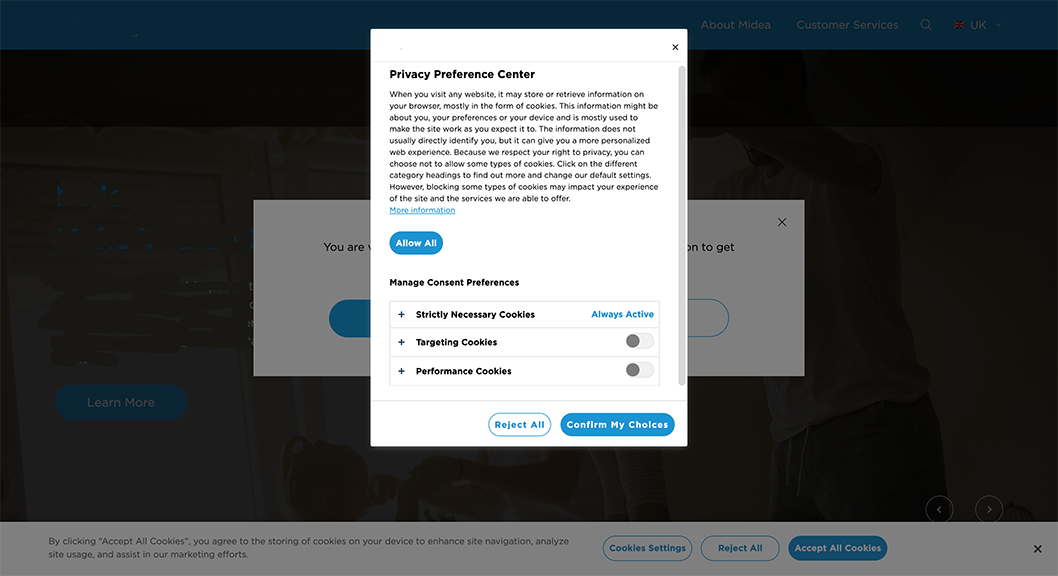What is a Consent Management Platform?
A Consent Management Platform (CMP) informs visitors about the types of data a website collects, provides users the opportunity to opt-in to the secure collection of their data, and determine how the information can be used. It stores user consent preferences, facilitating compliance with consumer data privacy policies, and manages visitors’ requests to make alterations about data usage.
A CMP presents those user-friendly pop-ups or elements most of us are used to experiencing when visiting websites. It’s important to note that by providing transparency related to personal data collection users are encouraged to provide consent, but some consent management banners also allow users to reject consent.

Why is it Critical for Websites to Ask for Consent Before Collecting User Data?
For one thing, it’s the law in the European Union and California, and soon other governments are expected to adopt such policies. Failure to comply with these privacy regulations can result in steep fines. Governments aren’t the only entities enacting these protections—some browsers and web platforms also follow strict privacy policies, and many other regulations are on the horizon.
About the CCPA and GDRP
CCPA
The California Consumer Privacy Act (CCPA) is based on an opt-out cookie consent policy. To maintain compliance for residents of California, website publishers can only load non-essential cookies once they display a notice consisting of relevant information about the use of cookies.
GDPR
The General Data Protection Regulation (GDPR) governs the use of cookies and other tracking technologies in the European Union (EU). Under the GDPR, consent is the lawful basis of data processing. The policy states that, “Consent must be freely given, specific, informed, and unambiguous.” This requires that an individual’s consent must be given voluntarily without any pressure or influence that could affect a user’s choice. Moreover, an individual must have the ability to withdraw his/her consent at any time, without any detriment. Such withdrawal of consent must be as easy as giving consent.”

Additional Benefits and Features of CMPs
- Provides consumers piece of mind about their data
- Ensures transparency about consumer data
- Demonstrates accountability: knowledge that if a company is non-compliant, they will be punished
- Reduces the amount of personal information lost during a potential data breach
- Provides visitors the option to remain private on your site
- Offers opt-in/opt-out options
- Choosing to opt-out: companies let users know that they collect and use data and provide users the option to opt-out. In this case, a user must take an action, such as unchecking a pre-checked box or completing a form to withdraw consent of the collection and use of their data.
- Choosing to opt-in: An action users must take to confirm the collection and use of their data.
- Leads to increased consumer trust by believing a brand is ethical regarding personal privacy.
- Serves as a proactive step to safeguarding companies from major national consumer protection laws expected to go into effect in the future.
- Increases the likelihood that consumers will be more confident about using services offered on a website.
An Out-of-the-Box CMP Solution: Tealium iQ Consent Manager
Tealium’s iQ Tag Manager can fast-track your website’s consent management the moment it’s deployed. By providing a template that is HTML/CSS/JS-based TiQ is highly customizable for branding consistency and can be used right out of the box with easy step-by-step set up instructions.
Other Benefits and Features of Tealium iQ:
- Easily change or update configuration preferences with version control
- Convenient functionality for saving or rolling back changes made in error
- Streamlined maintenance and update capabilities
- Availability of version control and environment control for quick access to testing before data sending to production
- Downloadable browser companion makes testing updates easy
- Ability to add or create load rules and omit tags for tracking, as needed
A CMP also Improves the Privacy of CDP Information
While it’s possible to build Customer Data Platforms (CDPs) for GDPR compliance, implementing a CMP provides additional compliance and reduces instances of marketers using compromised data. Since the data stored in CDPs is used to create a singular view of a consumer, they save all the preferences of the consumer’s privacy choices selected in the CMP.
How We Can Help to Improve Your Website Privacy Compliance with a CMP
Our Analytics Development team brings years of deep experience with CMP implementation and maintenance. As a strong Tealium partner we can make sure that you’re quickly up and running and compliant with data privacy regulations, if you choose to deploy Tealium iQ.
Regardless of which solution you choose to deploy, the adoption of an efficient CMP will prepare your business for compliance with existing and upcoming data privacy regulations. Let us know how we can help to keep your data safe and increase the trust and confidence of your customers.
